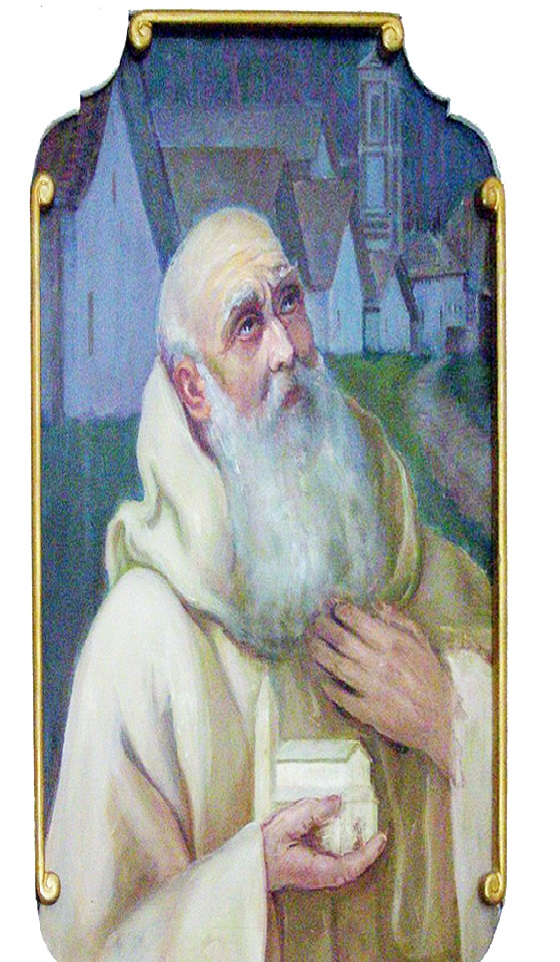St Romuald was born at Ravenna, Italy in 951 AD. Born to an aristocratic family, Romuald grew up with riches and was known to have a wild youth. Devotion to prayer or the call to holy Life was never taught or spoken of within the family setting. Unusually enough, Romuald felt a constant inner calling to the eremitical life all through his growing years, the feeling only intensifying is his teens. Real conversion happened when he witnessed his father, Sergius degli Onesti, kill a relative in a feud over property.
Romuald could not take the sight of this ghastly crime and fled, taking refuge for 40 days at the monastery of St Apollinaris near Ravenna in penance for his father. The stay wasn’t welcomed by the monks due to the extreme asceticism and piety practiced by Romuald.
He left Ravenna and travelled to Venice to become a disciple of the hermit Marinus, who taught Romuald to recite the Psalter every day. Marinus was a holy man and it was from him that Romuald was taught about Christ and the Word of God. Encouraged in his monastic vocation by seeing their hermit life, Peter Urseolus, Duke of Venice, joined Marinus and Romuald. After staying a few years with Marinus, Peter went on to join a French Benedictine monastery, Romuald followed him and lived in a hermitage nearby for five years.
Years later, Sergius came in search of his son who by now was famous for serving the Church and helping in the formation of hermit orders and monasteries across Italy. On seeing Romuald’s monastic life, Sergius had a conversion of heart and wished to become a monk himself. He failed many times in his attempts, but with Romuald’s support Sergius was eventually successful.
While travelling across Italy, Romuald made Pereum his favourite resting place. In 1005, he went to Val-di-Castro and lived there for two years prophesizing that he would return one day to die there, alone and unaided.
By the year 1012, he had helped setup and reform almost 100 distinct hermitages and monasteries. In the same year, a piece of land called ‘Camaldoli’ in the Diocese of Arezzo was gifted to Romuald by a man named Maldolus, who had had a vision of a ladder extending from this very plot of land to the skies, on it were several monks dressed in white, ascending into heaven. This became the site of five hermit quarters which then grew to become a monastery that became the famous Motherhouse of the Camaldolese Order. On hearing of the vision, the monks’ habits were changed from black to white. Setting up the Order wasn’t an easy task as Romuald faced severe attacks from the devil for five constant years prior to 1012 which he overcame with constant prayer.
St Romuald is famous for the ‘Brief Rule’ a thorough masterpiece, handed down by Saint Bruno of Querfurt. It speaks of sitting silent and watching one’s thoughts while meditating on the Psalms, repeatedly reading a Psalm when one fails to comprehend its meaning or singing it out in one’s heart.
In the Rule, St Romuald also speaks of how we ought to sit in God’s presence and empty ourselves out before him. For a man who received no formal source of theological education, writing this brief rule was marvelous indeed. Stories of his devotion to finding God in solitude extend to the time when he went into a solitary state in the woods for seven consecutive years. Interestingly, he battled temptations of the flesh in his younger life and used to go hunting to the woods where began this love for solitude, a perfect example of God transforming human weakness into strength for his greater glory.
In 1013, Romuald retired to Monte-Sitria, continuing his life of solitude. In 1021 he moved to Bifolco. Five years later he returned to Val-di-Castro and as prophesized died there, alone in his cell on 19th June 1027, which is now celebrated as his feast day.
Many miracles took place at his tomb over which an altar was erected in 1032. In 1432 his body was exhumed and miraculously found incorrupt. In a world full of materialistic clamour, the words of St Romuald, ‘Better to pray one Psalm on devotion and compunction than a hundred with distraction’ draws us one step closer to holiness like him.




